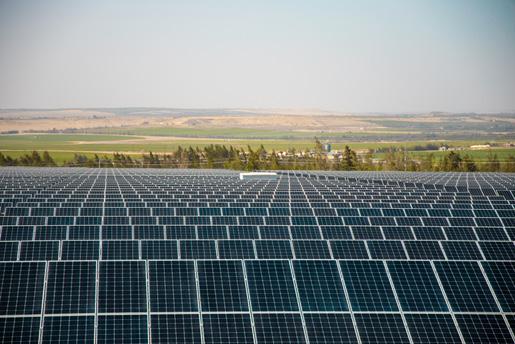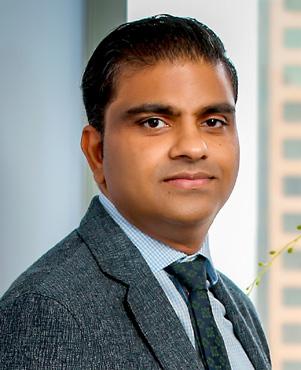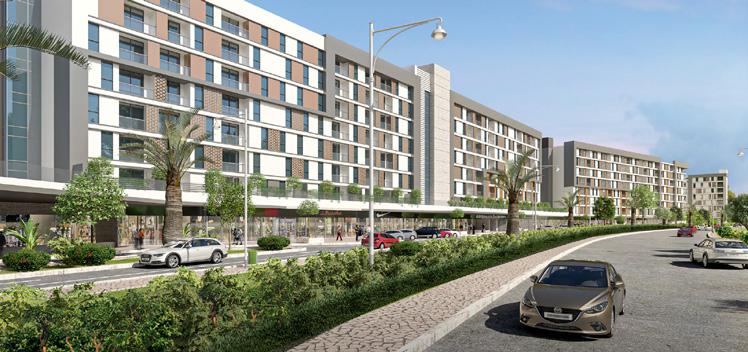
21 minute read
I Sustaining Power
• SUSTAINABILITY •
SUSTAINING POWER
Advertisement
Ahmed Zahran, CEO of Egypt’s KarmSolar, is powering the country’s transition to renewable energy amid a global shift away from fossil fuels. With an IPO on the horizon, the company could soon be helping to share Egypt’s solar power with the world.
BY NERMEEN ABBAS
IMAGE FROM SOURCE FORBESMIDDLEEAST.COM
AHMED ZAHRAN
T
Increasingly intense conversations on climate change have been hitting headlines worldwide in recent years, with governments and businesses putting environmental issues at the top of their agendas as new generations demand change. In the Middle East, the oil and gas-rich countries are setting ambitious plans to transform their economies from a reliance on fossil fuels to innovation in sustainable energy. Egypt, in particular, plans to increase the amount of electricity it generates using renewable energy from over 11% in 2021 to 20% in 2022 and 42% by 2035, with the private sector expected to deliver most of this capacity. Cairo-based solar energy company, KarmSolar, is already grabbing its market share as the nascent industry develops. “We are talking about a huge potential growth for renewable energies, especially with the launch of new major cities and projects,” says Ahmed Zahran, CEO and cofounder of KarmSolar. “Egypt is a big country. Electricity consumption has increased by 10% annually, and is expected to follow the same pattern.”
Having been established in 2011 to enable farmers to power their water pumps with solar energy instead of diesel generators, KarmSolar has since begun investing in solar stations, selling electricity directly to consumers. “We believe this model is more realistic for everyone. Businesses prefer injecting capital into operational activities and handing over the mission of investing in electricity to energy companies,” Zahran explains.
The strategy appears to be working. Having started operations a decade ago with $11,000 in funding, KarmSolar has since attracted over $48 million from a network of 61 investors. Today, it serves around 600 customers and has seen revenues jump four times since January 2019, according to the CEO. KarmSolar’s portfolio includes 12 operational solar stations that vary in size from 100 kWp to 16.8 mWp. The company is now putting plans in place for an IPO. “We delayed our plans to go public due to the COVID19 pandemic, but we want to be a listed company by 2025,” insists Zahran, although he declines to reveal the company’s current valuation.
Despite this growth trajectory, KarmSolar still only contributes marginally to the total energy generated in Egypt. The country relies on fossil fuels for around 88% of its energy, according to statistics by the Ministry of Electricity and Renewable Energy, followed by waterpower at over 7%, and 4.4% from wind and solar. “The energy market in Egypt is huge. Solar energy currently contributes a small part to that demand, and we are actively increasing that stake,” explains Zahran. But, as he looks for opportunities across the market, the CEO is finding innovative ways to expand the business.
In September 2021, KarmSolar took steps towards becoming a multi-utility enterprise by launching its KarmWater division, which will design, build, and operate solar-powered water desalination plants, with its first project set to be located at Marsa Alam on the Red Sea. Desalination turns saline water—which contains a high level of dissolved salts—into freshwater, which can be used for agriculture. In October 2020, the Egyptian government announced an ambitious plan to invest $8.6 billion in building desalination plants by 2030, with a target to provide 6.4 million cubic meters a day of potable water by 2050.
KarmSolar’s initial aim is to provide water for the tourism sector, while its eventual goal is to build a network that allows it to deliver water for agriculture. According to Zahran, the highest cost for desalination companies is producing enough energy required for the process. “Desalination companies focus solely on satisfying water demand. We are working on optimizing the process,” he clarifies. “By solving the energy problem of desalination, we can provide more sustainable water at cheaper prices.”
The company is also exploring financial solutions, signing an agreement with leasing and factoring company EFG Hermes Corp-Solutions in September that will see it offering financing to its clients at Arkan Mall in Cairo. Under the agreement, KarmSolar will allow Arkan Mall’s tenants to access finance from EFG Hermes Corp-Solutions using a behavioral scoring system. The system will give each individual tenant a credit score based on their electricity consumption patterns. EFG will then recommend a tailored
financing program accordingly, while KarmSolar will facilitate collections.
“Financial services have a direct and immediate impact on the growth of renewable energy companies and the market as a whole,” says Talal Elayat, CEO of EFG Hermes Corp-Solutions. “Since 2014, the Egyptian government has been very ambitious on increasing the energy mix.” However, growth requires capital, and renewable energy infrastructure comes with a high initial cost and capital expenditure, which can make investors hesitant. In Egypt, the market so far has been largely financed through international grants or development finance institutions, such as the European Bank For Reconstruction And Development and the International Finance Company, with a minimal portion financed through local financial institutions or banks.
According to recent data from the country’s New and Renewable Energy Authority (NERA), Egypt’s investments into renewable energy are set to hit around $826 million in the 2021/22 fiscal year, including $508 million from NERA and nearly $318 million from the private sector. “The government’s ambitious renewables targets, high natural solar and wind potential, growing domestic component manufacturing capacity, and a competitive liberal power market will all make Egypt an attractive market for renewables investment,” says Omar Attia, an Equity Research Analyst at Al Ahly Pharos Securities Brokerage.
Plans to develop high-voltage transmission interconnections with Europe could also see the market for renewable electricity exports grow significantly. “In the solar energy field, Egypt’s sun provides much more power generation capacity than regions in Europe and the U.S.,” Attia points out. “Egypt’s sun has an average yield factor that ranges between 2,000-2,300 kWh/kWp versus Europe’s 1300-1400 kWh/kWp.”
Overall, Egypt’s future as a potential global leader in solar energy seems bright—something Zahran first spotted back in 2011. At that time, he was working in the renewable energy division of a local energy corporation, while around him, Egypt reeled from a revolution. He and three colleagues— Yumna Madi, Randa Fahmy, and Xavier Aucliar—were made redundant amid the fallout. Spotting an opportunity, the four colleagues decided it was time to branch out on their own. They had previously been on a retreat to the Karm Ecolodge in Egypt’s mountainous St. Catherine district. The experience inspired the idea, and the name, for KarmSolar.
Deciding that solar-powered water pumping was a high-potential vertical, the team developed technology
that could convert diesel-powered pumps to solar and patented the designs. The CEO used $11,000 of his own personal savings to establish a joint-stock company. “We launched KarmSolar from a café in Zamalek, Cairo,” remembers Zahran. The cofounders used Google Earth to locate farmland and agri-developments in offgrid locations and personal connections to meet with farm owners and managers. KarmSolar entered the market constructing solar-powered pumping solutions for agri-developers in Wahat el Bahariya, Egypt. Within the first 12 months of operations, four investors had come onboard, contributing an initial total of $1 million. The company signed its first solar pumping project with Fridal in 2012, which was operational by 2013. That same year, it launched a KarmSolar R&D Campus in Wahat al Bahariya to support further development in the field.

A significant milestone came in 2016 when KarmSolar became the first company in Egypt to be licensed to sell solar energy to private customers through power purchase agreements (PPAs). Previously, only the government was allowed to distribute electricity through its national grid. This upped the game for the young company. It signed its first solar energy PPA with food manufacturer Juhayna Food Industries, inaugurating a 1MW solar station in Al-WahatAl-Bahareyah, which became operational in 2016. According to Juhayna’s website, the station now reduces its CO2 emissions by 1.6 tons and decreases its dependency on diesel by 600,000 liters per year. In 2017, KarmSolar joined the feed-in tariff program in Benban, Aswan, operating a station on its land in Sahl Hashish. The 37-square-kilometer Benban is one of the world’s largest solar parks, with a total investment of $2 billion. It will house 32 solar plants with 1.5GW of energyproducing capacity.
However, as Egypt plows more investment into renewable energy, companies are still facing obstacles. One of the main challenges, according to Zahran, is the unsteadiness of the production, with solar energy output varying throughout the day. “That causes problems as the public networks depend on steadiness and predictability,” he admits. Necessary regulations can also be slow to implement. “As per the electricity law of 2015, there is a reference to the wheeling and banking scheme, which allows solar companies to generate energy and wheel it to a different location,” explains the CEO. “While this regulation will completely transform and elevate the renewable energy market, it has not yet been activated.”
According to Attia, incentives such as tax rebates, VAT exemptions, loan guarantees, and contracts for difference have historically proven to support profitability in renewables. “Given Egypt’s massive electricity generation capacity of 50GW and a consumption of 30-35GW, this has allowed some renewable energy providers to be viewed as competitors with both parties vying for sales generation,” adds the analyst. “A solution for this is that the authorities become more rigorous in their efforts to export some of Egypt’s excess capacity for electricity generation.”
While his cofounders and investors, Madi, Fahmy, and Aucliar have since left the company to pursue personal endeavors, Zahran continues to expand KarmSolar as its markets grow. Although it currently focuses on the commercial, industrial, agricultural, and tourism sectors, looking ahead, the CEO is also taking residential customers into consideration, with plans to start supplying electricity to homes by 2023. The project is still in the study phase currently as the team works on the infrastructure, but Zahran has high hopes that within the next decade, most or all electricity will be generated from renewables. “The power utility business has seen little innovation over the past 60 years. We aim to disrupt the market,” he says confidently. “Our aim is to reach levels that no one has come close to before.”
Stay connected with our latest business news.
ENERGY SHIFT
In June 2021, the International Renewable Energy Agency (IRENA) published a World Energy Transitions Outlook outlining options that could help bring CO2 emissions to net zero by 2050. Here are some key facts from the report.
Scientists say we must reduce global greenhouse gas emissions by 45% by 2030 from 2010 levels.
Between 2014 and 2019, CO2 emissions increased by 1.3% annually on average.
260 gigawatts of renewablesbased energy generation capacity was added globally in 2020—more than four times that added from fossil fuels and nuclear.
In 2019 there were 58 million energy jobs worldwide—20% were in the renewable sector.
80% of the world’s population live in countries that are net importers of fossil fuels.
Electricity will be the main energy carrier by 2050, increasing from a 21% share in 2018 to over 50% in 2050.
To achieve the 2050 goals of the Paris Agreement, planned investment in energy transition will have to increase by 30% to a total of $131 trillion between now and then
Scan this QR code to open the website
Leading The Pack
Abdul Jebbar P.B, Group Managing Director of U.A.E.-based manufacturer of disposable food packaging products, Hotpack Global, explains the trends affecting the industry and the company’s plans for the future.
Abdul Jebbar, Group Managing Director
Hotpack recently won the Dubai Smart Industry Award 2020 for quality in the manufacturing sector. What does this success mean to you? Starting out in 1995 as a manufacturer of packaging products, Hotpack has continually embraced state-of-the-art manufacturing technology at the core of its growth and operations. Hotpack packaging has developed impactful high-end packaging solutions at competitive prices by implementing a fully integrated system, which connects all business areas. We introduced a first-of-itskind exclusive e-commerce platform and launched retail showrooms dedicated to packaging products.
We currently export our products to nearly 100 countries from our 12 manufacturing plants and direct operations across 13 countries. Apart from branches all over the Middle East, we also have operations in the U.S., the U.K., Africa, Australia, Spain, and India. Furthermore, we are in the process of setting up new manufacturing and distribution bases in Europe and Asia. Hotpack is not just a manufacturer of packaging products anymore but a brand in itself. We have never looked at packaging as an additional cost to a product but as a value addition to the entire marketing process. For us, packaging is the product.

What are the major challenges you are facing in the industry, and how have you overcome them? The packaging industry is going through vast and significant changes causing a major shift in customer demands. While the demand for food packaging has increased, the product mix and priorities have changed drastically. These trends are continuously followed by Hotpack, and we respond with the latest packaging solutions. Further, soaring freight rates, port congestion and equipment shortage are some of the recent challenges the packaging industry is facing in the region. However, since Hotpack’s secret mantra lies in backward integration, we have reduced our dependency on these various factors and this has helped us become self-sufficient. Only those who can adapt to the new norms and invest in the latest trends can survive. How do you see the company and the packaging industry developing in the coming years? Globally, the packaging industry is expected to touch the $1 trillion mark by 2024. Hotpack is set to transform from a regional player to a global leader. In keeping with our vision, the company is determined to continue embracing digitalization and smart strategies that we initiated several years ago. Our smart use of technology, which combines robotics, big data, IoT, and artificial intelligence, forms the backbone of our operations, from raw material sourcing and production up to customer delivery and after-sales follow-up.
What are your future goals for the company? Our research and development team is very active in identifying product categories that further minimize our ecological footprint. Sustainable packaging is the future and we are working hard to incorporate a circular economy to create opportunities in recyclable, compostable products that will help minimize our CO2 emissions and make our planet a better place to live for future generations.
www.hotpackglobal.com

Solid Foundations, Bright Future
Dr Anil Pillai, Founder and Chairman of Airolink, explains how his company has overcome the challenges of the pandemic, and how it plans to retain its position as one of the U.A.E.’s EPC contractors of choice.
Dr Anil Pillai, Founder and Chairman
How have market conditions changed over the past year and how have you continued to differentiate the Airolink brand throughout? COVID-19 and the resultant market conditions in construction and building contracting have reiterated the importance of sustainable business models for companies seeking to adapt and grow. Financial discipline and structured growth strategies are key to succeeding in such challenging times. However, despite the dip in the market and with the U.A.E.’s appeal and regulatory measures, we are all optimistic of a recovery. In fact, the signs already indicate a positive upward trend. At Airolink, we are not just adapting to the changing market conditions, but also initiating measures to create viable opportunities to grow and evolve. Our proactive management, particularly in mitigating the impact of COVID-19, has gained us the trust of our esteemed clients, who have in turn supported us. The results of our approach and our valuable client relationships are showing, with Airolink poised to hand over more than 6.3 million square feet of built up area (BUA) by the end of the year – a remarkable achievement considering the challenges.
You have recently secured a contract with Union Properties. What makes Airolink a partner of choice for developers? The Airolink brand has always been synonymous with quality and commitment, but the recent progress on all our projects has distinguished us as one of the prominent contractors of choice for our clients. We have proven our ability to effectively utilize our resources and models from construction contracts to engineering, procurement, construction, and finance (EPCF) contracts, as well as turnkey projects, public-private partnership (PPP) ventures, and design, build, operate, transfer (DBOT) projects.
We have also successfully maintained our preferential position with the financial institutions and governmental entities. When a listed company such as Union Properties is placing their trust in Airolink for first phase contracts as part of AED 2.2 billion ($599 million) developments, this is reflective of the brand’s trust in the market to perform and in in their ability to outgrow the competition.
What qualities and strengths will enable Airolink to achieve long-term sustainable growth? Our biggest asset is our people. They are hand-picked from the global pool of best talents in the industry. They are adept at managing not just projects, but also changing market conditions, to produce results that exceed the expectations of our clients. Of course, our systems and processes have been developed and optimized over the years to back them. We are also empowered by a specialist pool of subcontractors and trusted vendors who have been partnering with us for over a decade and who understand the stringent requirements of quality and timely delivery.
Scan this QR code to open the website

of technology. Such a balance will also help firms like Airolink to beat the competition presented by new entrants in the industry.
How important is sustainability and how are stakeholders working together to incorporate it into the sector? Sustainability is key to ensuring a balanced ecosystem in the future. From regulatory authorities all the way to project owners and contractors, there is a significant drive towards sustainability, as this is the path to guaranteeing a better tomorrow. Cost and time are concerns, but balanced approaches are yielding excellent results for the proactive adopters, and time will surely define their success and prominence in the sector.
How is technology changing the dynamics in the construction market? With the emergence of technology and innovation in every sector, I have to admit that the construction sector has perhaps not embraced the true capabilities. However, the U.A.E. is particularly well positioned to adopt the latest advances in technology. It is worth noting that from smart sustainable cities to immersive user experiences, the country has always led the way, and with Expo 2020 Dubai now underway, focus is on the U.A.E. more than ever to lead by example.
At the company level, main contractors such as Airolink are adopting innovative technologies including building information modelling (BIM) and enterprise resource planning (ERP), and the advantages are starting to show in terms of increased operational efficiency. More broadly, smart construction methodologies and sustainability-driven measures are bound to revolutionize the U.A.E. construction industry. At Airolink, we have embraced these advances; we have adopted smart solutions into our operations and we are constantly aligning ourselves to be at the forefront of change.
Do you feel that a changing market environment, technological progress, and disruptive new entrants will trigger an industry overhaul? Change is imminent and adapting to these changes is vital, not just for growth, but more importantly for sustenance in the industry. As history has taught us, this applies to even the largest of firms.
For companies and the wider industry to thrive, a delicate balance must be struck between legacy systems and innovative advances to ensure sustainable growth through the right adoption www.airolinkgroup.com

Sustainability, Mobility, Opportunity
As Expo 2020 opens its doors to the world, we release five new lists to celebrate the global fair’s theme of “Connecting Minds, Connecting The Future” by exploring sustainability, mobility, and opportunity. Sustainability
As sustainability issues continue to hit headlines worldwide, businesses that are good for the environment are also good for the bottom line. Investors globally are today placing value in companies that have strong sustainability schemes. While not yet mandatory, reporting on your environmental, social, and governance initiatives is becoming more common, and investors are increasingly using reports as part of their analysis process to identify material risks and growth opportunities.
Governments across MENA are looking to promote green technologies and good practices. For example, sustainability is a key part of Saudi’s Vision 2030, the U.A.E. has launched a Ministry of Climate Change and Environment, and Egypt has announced a sustainable development strategy.
The sustainability scene in the region is very diverse. Large local and multinational companies with their core business in traditional industries are executing billion-dollar sustainability projects or spending millions on making their operations better for the environment. There are also many established companies whose core activities are already in environmental industries like renewable energy and waste management.
10 Sustainable Companies In MENA These companies’ core business activities create a positive impact on the environment. We considered: • Size of the business in terms of assets, revenues, project value, and production size. • Environmental impact in terms of carbon emissions, waste, and the consumption of resources. • Transparency in reporting sustainability figures. • Diversity in terms of geography as well as technology and subsectors. This is not a ranking. Companies are presented in alphabetical order. 10 Sustainable Projects And Initiatives In MENA We highlight projects and initiatives undertaken by companies whose core business is more traditional. They are either diversifying to include green businesses or have made changes to their operations or infrastructure to have a positive impact on the environment. We considered: • Size of the project. • Environmental impact in terms of carbon emissions, waste, and the consumption of resources. • Uniqueness and innovation. • Transparency in reporting sustainability figures. • Diversity in terms of geography as well as technology and subsectors.
This is not a ranking. Companies are presented in alphabetical order.
To nominate yourself or someone else for our lists, email: info@forbesmiddleeast.com

Mobility
Despite a difficult period due to the pandemic, travel and tourism remains a vital sector for MENA. While tourism has always been important for the U.A.E., Egypt, and Jordan, now other GCC countries, including Saudi Arabia and Oman, are looking to attract more visitors. The region’s airlines are an important enabler of this industry, connecting MENA to the world.
Logistics companies are also key enablers, moving goods and services across the globe. Many MENA countries are developing their port infrastructure as they compete for a bigger market share of global trade. While the U.A.E. is the market leader, Oman, Saudi Arabia, and Egypt have also announced large investments in this sector. The growth of e-commerce is also transforming the logistics industry, increasing the importance of sectors like warehousing and last-mile delivery.
MENA’s 10 Biggest Airlines When ranking MENA’s airlines, we used numbers from the 2019/20 financial year, as government regulations and other initiatives skewed 2020 numbers to a large extent. We considered: • Fleet size. • The number of passengers transported. • The number of locations the airline connects. • Date of establishment.
MENA’s 10 Biggest Logistics Companies The region’s biggest logistics businesses are ramping up again after a tough period. When compiling this ranking we considered: • Size of the company in terms of assets, revenues, and market value. • Percentage of trade enabled by the company, and therefore its importance to the economy. • Quantity of goods transported or stored.
Opportunity
Regional startups are using technology to disrupt traditional business and make the Middle East a key player in global innovation. In doing so, they are creating opportunities by inspiring MENA’s youth and building new ecosystems for future growth.
10 Sustainable Startups In MENA While receiving millions in funding, green startups are having a lasting effect on the region, and we weighted this impact more than funding when compiling this list. We considered: • Current and potential environmental impact. • External funding. • Diversity in terms of geography as well as technology and subsectors. This is not a ranking. Companies are presented in alphabetical order.
5 FACTS: EXPO 2020
192 countries
are participating in Dubai’s Expo.
90%
of the key materials used in building the Expo site were procured in accordance with the Sustainable Materials Guidelines.
50%
of the landscaped plants used on the site come from native and adaptive species.
25 million visits
are expected onsite during the six months of Expo 2020.
140 grantees
from 76 countries are being supported by Expo Live’s Innovation Impact Grant Programme, which backs projects with creative solutions to pressing challenges.











